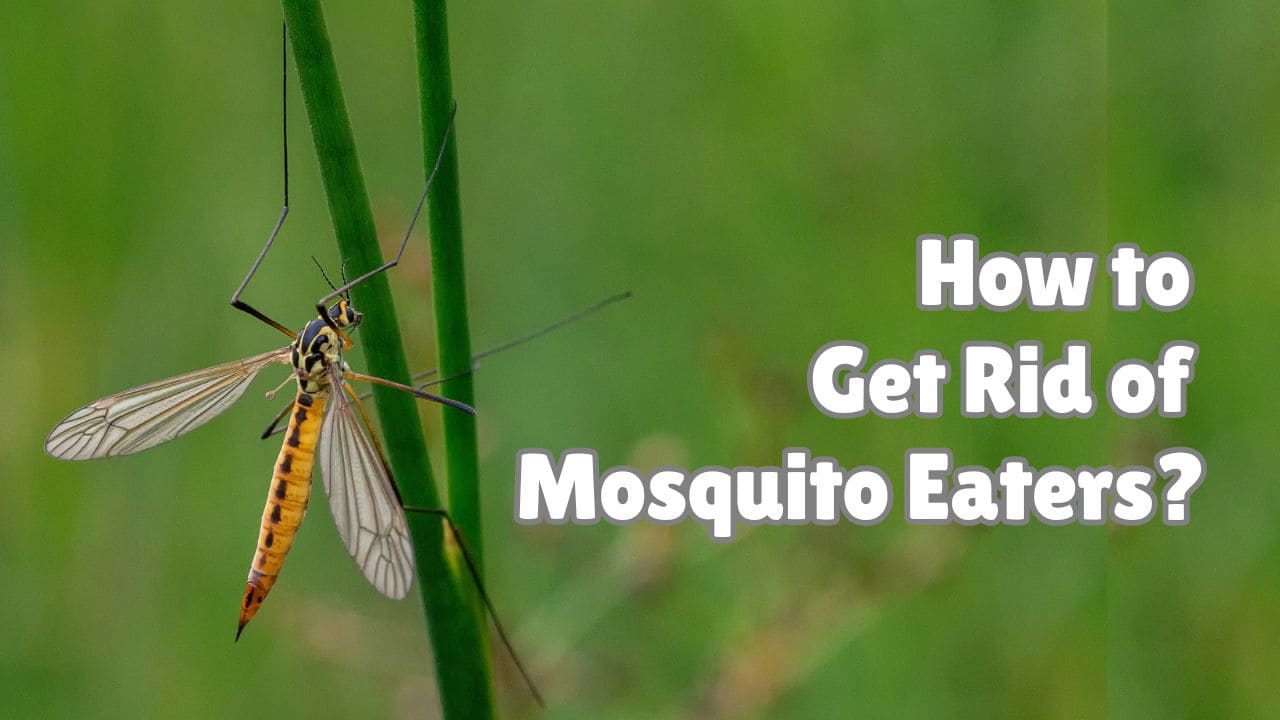What do mosquito eaters do?
These are actually crane flies, and often misunderstood as large mosquitoes. As their name suggests, they do not prey or feed on mosquitoes. The adult crane flies primarily focus on reproducing rather and most of them do not feed in their short adult life span. These mosquito eaters usually do not feed, however some may feed on nectar or plant juice.
The larvae of these mosquito eaters, mainly have a longer life span at these stage and they feed on mainly decaying plants, roots and other organic matters. Crane flies larvae stage are found in water streams, below wet logs of wood, edges of pond, or in damp and marshy places.
The larval stage of these mosquito eaters may last for up to several months and therefore if they are present in your garden or yard, may cause nuisance by damaging plants and flowers.
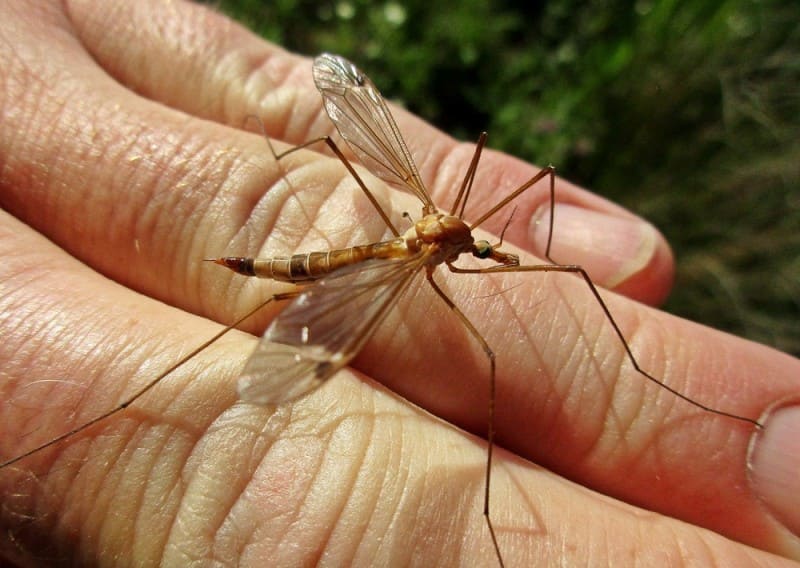
Image Credit: Google Images | Creative Commons
Why their presence is undesirable?
The mosquito eaters when present in our garden, will feed on roots of the plants and can damage the health and ruin the look and appearance of your garden or lawn. This larval feeding will kill young plants and all other plants may find difficult to survive.
This larvae can be of importance in maintaining soil health and eco system for which they are also called as “leather jackets”, but it will definitely be a problem for you as a home owner or gardener, if their population is not under control.
The uncontrolled feeding of their larvae on plant roots may result in brown patches all around your garden, and the plants will also exhibit stunted growth. This weakens the plants and their resistance, and they becomes more susceptible to plant diseases and damage due to other insects and environmental factors.
The adult crane flies can also be undesirable, as they are attracted to light and therefore they gather around porch lights, outdoor lightings, etc. They may find access to enter your home through windows at night.
Although, they are completely harmless but their presence and erratic landing or crawling on your body makes you feel ugghhh!
If present in larger numbers in your outdoors, they will spoil your gatherings and quality of life. For those home and garden owners who takes utmost care in maintaining their gardens will definitely have an awful and frustrating experience.
Preventing mosquito eaters from entering our home
As they are very annoying and undesired when comes inside our home, we can take following steps to keep them away from entering our home:
- Close all entry points: Repair and seal any gaps or holes that may allow crane flies to get access inside your home.
- Install window meshes or screens, door sweeps, etc.: Installing window screens and mesh to cover the windows completely making it inaccessible for crane flies. Installing door sweeps, will seal the gap beneath the doors and will completely ban their access.
- Reduce outdoor lighting: keep minimum light outside your home as it can attract crane flies. Make use of yellow tinted bulbs, instead of LED’s which are more attractive to them.
- Make use of natural repellents: Natural repellents like essential oils of eucalyptus, lemon grass or citronella, lavender, are known to have a good insect repelling properties including crane flies.
Controlling mosquito eaters to protect your garden
If you want to protect your garden or lawn from these crane fly larvae, you must control the population of crane fly. If not done or left unchecked they will rise in number and as they thrive on moist and nutrient rich soil with plant roots, they will cause a huge blow to your garden.
How to Get Rid of Mosquito Eaters
There are many methods as given below to protect your garden from these mosquito eaters:
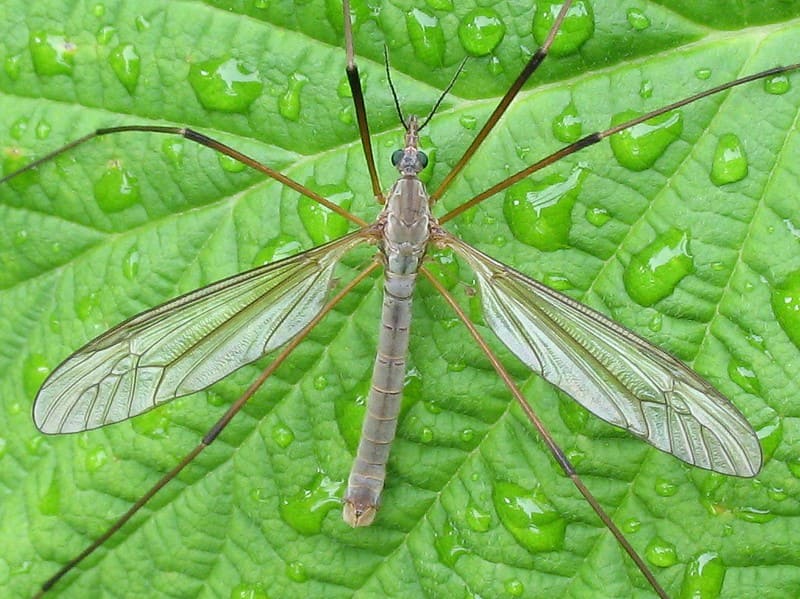
Image Credit: Google Images | Creative Commons
1. Invite natural predators:
Introduce predators birds and animals that feed on crane fly larvae. There are birds like starlings and robins and other predators like frogs, raccoons, skunks and lizards which feeds on crane fly larvae. Invite these birds through installation of bird houses, bird baths and bird feeders in your garden, and they will naturally control the crane fly population.
2. Lawn maintenance:
Maintaining the health of your garden and keeping it free from clutter and wastes, can prevent crane fly larvae infestation in your garden. Regular mowing and aerating soil can reduce larvae infestation in plants, and makes them difficult to survive. They lay eggs in moist and shades of overgrown lawns. Thus, by trimming lawn and removing thatch and grass clippings regularly, and keeping it dry we can reduce larvae infestation.
3. Watering practices and soil flooding:
Leaving the soil moist with excess surface moisture can create perfect conditions for their growth. You should water the plants deeply and infrequently to allow the roots grow deeply inside, and keeping less surface moisture.
Flooding with limited amount of water can bring larvae to top of the soil, which allows the predator birds and animals to easily find and consume them. However, it should be monitored as it can also invite crane flies for egg laying.
4. Aeration:
Aerating the soil keeps it dry and removes excess moisture thus allows better soil drainage, which restricts the sustainability of larvae in soil. Well aerated soil is not the place where the crane flies will prefer future infestations. It also allows healthier grass growth, which are more resistant and can withstand minor root damages.
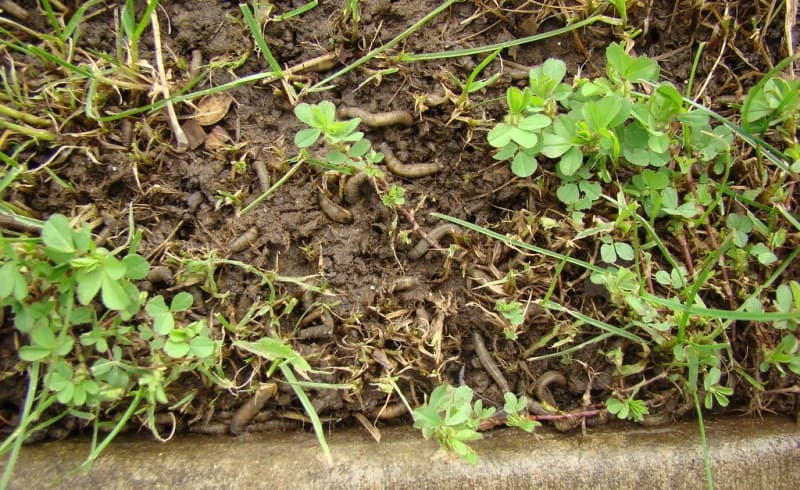
Image Credit: Google Images | Creative Commons
5. Soil treatment with Nematodes:
We can treat soil with natural tiny parasitic worms called nematodes, that specifically feed on crane fly larvae. It does not harm other plants and insects in your garden. You may need to repeat as it is effective but may take some time.
6. Use of BTI to kill crane fly Larvae:
BTI (Bacillus Thuringiensis Israelensis) is a naturally occurring bacterium that targets the larvae of crane flies and not harmful to any other plants and animals or birds. It should be applied at the right time and its a widely used biological pest control method used mainly for mosquito larvae.
7. Chemical pesticides:
This should be done only if the situation goes out of your hand. If the infestation has gone beyond our reach of control and no other method works. You should be aware of that the use of such pesticides can also harm beneficial insects and organism in your garden.
8. Manual removal:
If they are present in few numbers, you can use nets, fly swatter, fly bats, or traps to catch and remove them from your house.
What kills mosquito eaters?
Here is a small list of those, that kills mosquito eaters:
| What kill Crane flies | What is it… |
|---|---|
| Starlings | Bird |
| Robins | Bird |
| Raccoons | Mammal |
| Skunks | Mammal |
| Shrews | Small mammal |
| Frogs and toads | Amphibian |
| Spiders | Insect |
| Dragon flies | Insect |
| Mantises | Insect |
| Bats | Mammal |
| Nematodes | Parasitic organism |
| Ground and Predatory Beetles | Insect |
| Lizards | Reptile |
| BTI (Bacillus Thuringiensis Israelensis) | Microbial Larvicide |
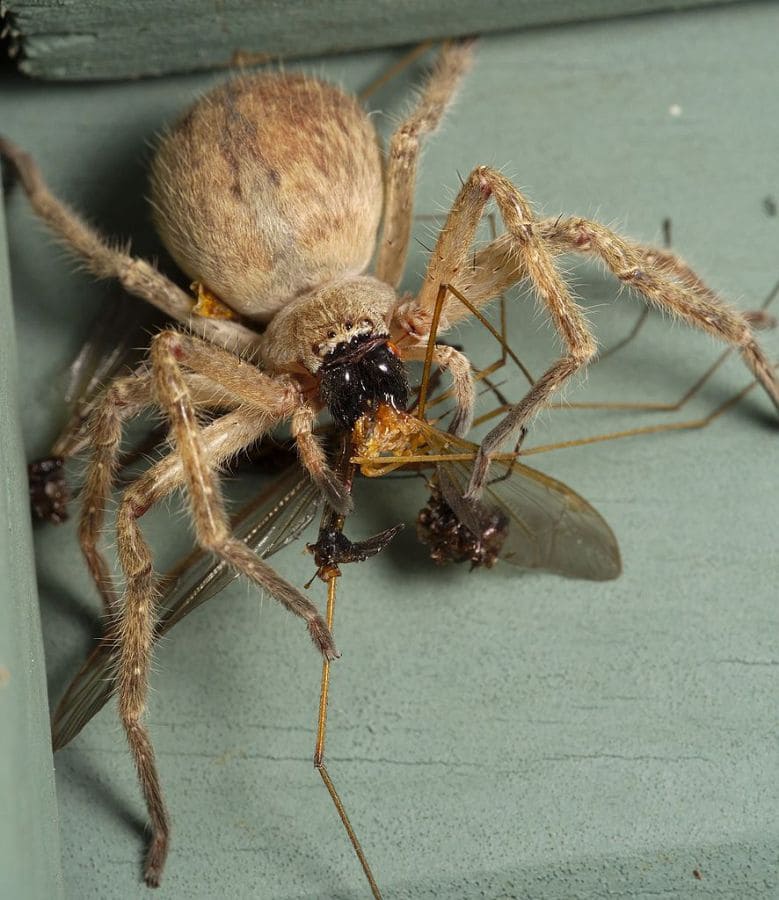
Image Credit: Google Images | Creative Commons
How to keep mosquito eaters away?
Here’s a detailed table with methods to practice explaining – How to get rid of mosquito eaters?
| Method | Details | Benefits | Considerations |
|---|---|---|---|
| Invite natural predators | Encourage birds (starlings, robins) and other predators like (raccoons, skunks, frogs, lizards, etc.) that feeds on adult crane flies and larvae. | Helps controlling the population of adult crane flies as well as their larvae. | It is not instant but can give better results in the long run. |
| Lawn maintenance | Keep crane flies away from laying eggs in your lawn and garden, by mowing and trimming grass regularly. Remove grass clippings, thatch, dried leaves, waste and clutters, etc. | The crane flies will find no place to lay eggs and will reduce their population. | Requires consistency and commitment. |
| Soil flooding and watering | Soil flooding will bring the larvae at the surface where predators can easily consume them. Infrequent watering will keep the surface dry and allow deeper root growth. | Naturally and logically reduces larvae population. | danger of over watering or over flooding that may invite crane flies for egg laying. |
| Aerating the soil | It disrupts the larvae habitat and end up their survival. | It improves overall garden and lawn health. | Should be done seasonally. |
| Soil treatment with nematodes | Add nematodes, parasitic organisms that will consume crane fly larvae. | It targets larvae only and do not harm other plants and beneficial insects. | May be done periodically for better results. |
| Using BTI to kill larvae | These are natural bacterium mainly and widely used for mosquito larvae also effective in case of crane fly larvae. | It targets larvae only and do not harm other plants and beneficial insects. | Should be applied to target larvae, hence timing is important here. |
| Using pesticides | For excessive and uncontrolled infestation, make use of chemical pesticides. | Tt can kill both adult and larvae with a fast and Immediate action. | Should be used at last resort only, as it may harm other beneficial insects. |
| Manual removal | Using vacuum, fly swatter, fly bats, or nets, adult flies can be removed manually. | Immediate removal and suitable only for small numbers. | Not useful for large populations at outdoor spaces. |
| Reducing outdoor lighting | Make use of yellow tinted or bug lights at out door spaces. Keep the light dim at outdoors as it attracts crane flies. | Helps in preventing crane flies to enter our homes. | Limit outdoor activities. |
| Window screens and door seals | Keep your windows and doors closed to prevent adult crane flies to enter inside. | It will prevent any chances of indoor infestation. | Requires attention to keep them closed and maintained. |
| Sticky traps and UV traps | Use traps like sticky traps or UV traps to catch adult crane flies. | Will reduce adult crane flies population in garden and outdoor areas. | Must combine with other methods to get completely rid of mosquito eaters. |
| Essential oil sprays | Use natural essential oils like eucalyptus, citronella, lavender etc. near windows and doors, and outdoor areas. | Without any use of harmful chemicals, it helps to keep the crane flies away. | Need to reapply again as they are volatile and may not last long. |
Frequently Asked Questions (FAQs)
-
What are mosquito eaters actually called?
Mosquito eaters actually called as crane flies. However they have other names also like skeeter eaters, mosquito hawks, etc. Their larvae is called leather jackets, as they help in maintaining soil health and nutrition.
-
What are mosquito eaters attracted to?
Mosquito eaters are mainly attracted to light. You might have seen if you left outdoor lights switched on, these crane flies invade the area around the light.
-
How long do mosquito eaters live?
Mosquito eaters at the adult stage lives hardly for few days to a couple of weeks. However, at the larval stage they have a quiet long life span which ranges to several months.
-
Why are crane flies called mosquito eaters?
They actually resemble like a giant mosquito, and due to a misconception or there’s a myth around that says, crane flies eats mosquitoes. And from there it has gained popularity as mosquito eater. However, the crane flies never eat mosquitoes.
-
How do you get rid of crane flies naturally?
We can make use of minimum light at outdoors. We can adopt various measures like lawn maintenance, using nematodes, encouraging natural predators like birds, frogs, spiders, raccoons, skunks, bats, and using BTI bacterium, soil aeration, essential oil repellents, etc. These all methods can help us in getting rid of crane flies naturally.
-
What smell do crane flies hate?
The crane flies hate smell of natural essential oils like peppermint, lavender, eucalyptus and lavender. these oils are known insect repellents.
-
How to get rid of mosquito eaters in house?
You need to install window screens and nets, seal the gaps below the doors with door sweeps, using natural essential oil sprays or diffusers to repel them.

